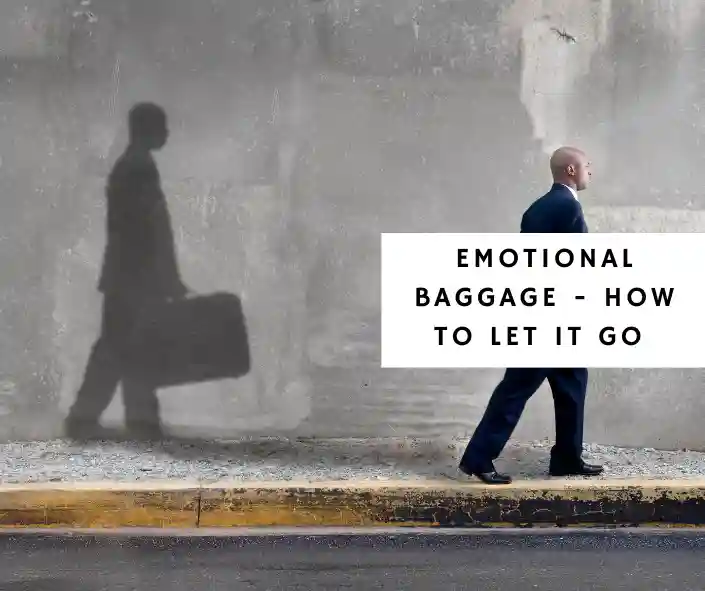

Few other factors are more damaging to our mental health than emotional baggage. All the minor insecurities that surface during our lifetime – as a result of our experiences or upbringing – are referred to as emotional baggage. Relationships, careers and our overall happiness can be harmed by our emotional baggage.
It takes time, dedication, and a lot of personal resolve to get over the negative effects of carrying around emotional baggage. Every single one of us has the capacity to heal, but we must first learn to accept reality as it is, to be in the now, and to forgive ourselves for the things (and people) we cannot alter.
What is emotional baggage?

There can be many different types of emotional baggage. Anything from our early experiences to our most current romantic relationships, can contribute to the hang-ups we have throughout our lives. Learning is the key to overcoming emotional baggage, particularly learning to trust yourself and others around you.
Here are a few common types of baggage people carry around:
Dysfunctional family
Being raised in a chaotic or dysfunctional family is one of the most common causes of emotional baggage. We develop the emotional behaviours and patterns that define who we are through these early experiences, which are fundamental to family dynamics. It has been noticed that adverse early experiences can hinder neurodevelopment, which can lead to mental, social, and even emotional damage. Bad family experiences can teach us to be controlling, untrustworthy, and abusive, but all of those things can be altered if we choose to.
Previous traumatic relationships
Relationships are often very complex and dynamic, and even when they end, they may still be complicated. This is particularly true when it comes to toxic or abusive relationships – which are one of the main drivers of the emotional baggage that weighs us down and ruins our happiness. You could feel devastated, confused, and hopeless after ending an abusive relationship or one in which your trust was betrayed. And it’s common to repeat toxic behaviours and draw toxic individuals into your life if you don’t give yourself the necessary time to recover.
Mental health problems
Even just getting a mental health diagnosis can come with its own form of baggage. Struggling with depression or anxiety can completely absorb a person. People who battle with these issues often enter relationships feeling hopeless or unworthy, and this alone can cause them to engage in destructive behaviours that can challenge their partners, families, and friends. Not dealing properly with mental health problems can bring the whole ship down, therefore it’s essential to identify these difficulties and reach out for help by seeing a mental health professional, such as a psychologist.
Four steps to help you overcome emotional baggage
Here are some suggestions for what to do if you’ve realised that your emotional baggage is preventing you from moving forth.
What is it exactly that is hurting you?
Ask yourself. We need to do some investigative work, since sometimes we are unaware of the true problem at hand. We can begin to choose the next course of action once we have determined the cause.
Learn to sit with the anger, pain and/or sadness.
This is a crucial step in learning to cope and helps us to develop resilience to deal with the situation. Recognise the emotion and acknowledge that it’s normal to feel that way. Often people try too hard to brush it off or bury their emotions. However, that only works temporarily; over time, it only accumulates. Gain the ability to recognise the emotion and give yourself time to breathe slowly through it, then tell yourself again that you can get through this.
Is there something you can do to fix the situation?
There are instances when we genuinely need to consider whether there is anything that can be done to change what has already occurred. This process can be challenging. Working through this can take some time, so you might want to get some expert assistance from the help of a mental health professional.
Learn to let go.
Holding on to things might feel better, since it’s a habit you’re used to. We might believe that by holding on, those who have inflicted the grief will continue to be punished. However, in truth, we are the ones being held captive. We don’t forget just because we let go. It implies that it no longer governs or shapes how we act. Our thought patterns play a significant role in this, therefore recognising our thoughts and confronting the ones that keep us stuck in the past will help us advance. Learn more about forgiveness and how to let go of grudges here.
Get help to work through emotional baggage
Processing your emotions requires considerable mental lifting. The good news is that you don’t have to do by yourself. If you would like to work through your emotional baggage, our team of experienced psychologists at Positive Mind Works can help. To book, or call our friendly reception team on 1800 327 477 (AU) / 0800 327 477 (NZ).

